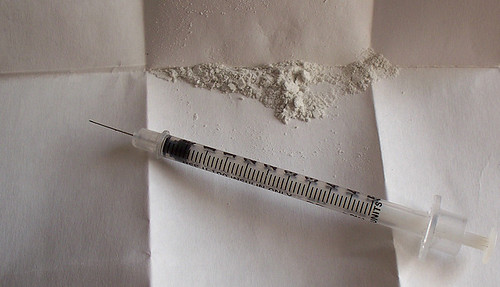Oregon legislators reverse course on drug legalization in the face of increased overdose deaths and crimes in Portland.
By Eileen Griffin
Progressive policies, such as the decriminalization of drugs, have fueled an expansion of drug addicts, homelessness, crime, and human tragedy.
With the explosion of problems since decriminalizing most drug possession, Oregon legislators are proposing to reinstitute criminal penalties for drug use, The Oregonian reports.
In 2020, voters passed Measure 110, a policy decriminalizing most drugs in the state, with 59 percent of Oregonians in favor, The Oregonian reported at the time.
A New York-based criminal justice reform group, Drug Policy Alliance, was largely credited for the victory. The organization spent more than $4 million on the campaign to decriminalize drugs. George Soros financially supports the group and serves on the board.
Mark Zuckerberg, CEO of Facebook, and his wife Priscilla Chan donated $500,000 to the Oregon campaign supporting Measure 110.
Once passed, Measure 110 reduced misdemeanor drug possession to an infraction on par with a speeding ticket. Felony drug possession was reduced to a misdemeanor.
State Senate Majority Leader Kate Lieber (D-Beaverton) is leading the effort to make drugs illegal again.
“The drug crisis in Oregon right now is unacceptable,” Lieber told The Oregonian. “We cannot go back to the failed war on drugs. We’ve got people dying of overdoses in the street. We need to develop a plan that urgently expands access to treatment.”
Proposals include tougher penalties for drug users as well as a more aggressive approach to prosecution of drug dealers.
In the first six months of 2023, the city of Portland had 137 fatal drug overdoses, City Journal reports.
Public support for Measure 110 has declined as the use of fentanyl has surged. Business owners and residents are tired of the blatant public drug use and the corresponding problems a large population of drug addicts presents.
Manhattan Institute Fellow Charles Fain Lehman says Portland, Oregon’s largest city, has a major drug problem.
“The drug-overdose death rate more than doubled between 2018 and 2021,” Lehman writes. “In 2021, more than one in every 2,000 county residents died from a drug overdose, usually from fentanyl or methamphetamine. The problems tend to intersect: nearly 200 homeless people died in the county in 2021, and 82 percent of those deaths involved drugs.”
In addition to the growth of drug use and the number of drug users overdosing, other tangential problems are on the rise also. Property crime has surged since the passage of Measure 110 as addicts steal to fund their need for drugs.
“If drug use is less controlled, it increases, and so do its negative social effects,” Lehman writes.
Drug users from other parts of the country have moved to Portland to enjoy the lax environment. Homeless camps are easy to join, and drugs are available openly. Portland has become a magnet for drug users, increasing the city’s problems.
“Large parts of Portland’s downtown and Chinatown districts are now open-air drug markets,” Lehman writes. “One outpost of the city’s famed Voodoo Donuts, for example, is an island in a sea of drug use and camping. The city’s bridges now offer not only a beautiful vista of the Willamette River but also the ugly sight of people living in their own filth.”
The decriminalization of drugs has also normalized drug use for minors, City Journal reports. Although those under the age of 18 are still prohibited from using drugs, they have much easier access when so many adults around them are using.
Drug-abusing adults also do not function well in their role as parents. Children of drug addicts are often neglected and unsupervised. They can also become accidental victims as they are exposed to the drugs their parents are using.
“For all the havoc that Portland’s lax drug laws, soft-on-crime policies, and burgeoning homeless population have visited on the city, few observers have noted their impact on young children,” writes Naomi Schaefer Riley, a senior fellow at the American Enterprise Institute. “When abused or neglected, the kids are often hidden by their addict parents from other adults.”
Proponents of Measure 110 say that the drug users should not be punished for having an addiction. Rather, they should be assisted in getting health care.
“It’s a huge distraction from the real problem, which is access to healthcare, and I think it will cause far more harm in our communities, which is why we voted to remove it in the first place,” Mercedes Elizalde, director of advocacy for the Latino Network, told The Oregonian.
Elizalde also said that criminalizing drugs, “ignores the disproportionate harm to people of color.”
“If we have to err, it’s better to err on the side of more criminalizing than less,” says Portland real estate mogul Jordan Schnitzer. “We have got to put a stop to the human tragedy and the blight.”
Schnitzer and others favor a return to the time when drug use was treated as criminal behavior. Rather than rely on the Democrat-controlled legislature, Schnitzer and others are backing an effort to take this decision to the voters.
A contributor to the effort, Columbia Sportswear President and CEO Tim Boyle, agrees that it is time to get drug user under control in Oregon.
“We really need to get as stiff a penalty as is required to get people into treatment,” Boyle said. “What we are doing today is not working.”
For more great content from Budget & Tax News.
